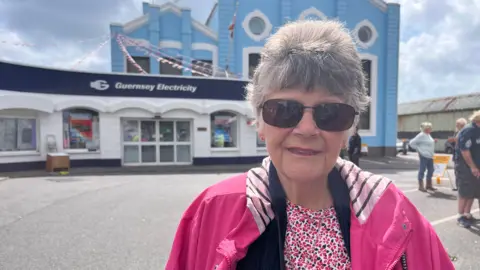In Guernsey, the representative protests against soaring electricity prices have garnered notable attention, highlighting the struggles faced by locals amidst significant price increases. Over 100 demonstrators gathered outside the Guernsey Electricity Limited (GEL) headquarters to voice their concerns as the company plans to raise electricity tariffs starting in July. The planned increases are projected to leave some residents with utility costs higher than those in mainland UK, which has incited rightful anger and frustration among the populace.
Among the demonstrators was 70-year-old pensioner Katina Jones, who expressed the harsh realities many elderly residents face in dealing with inflated energy costs. She openly shared how she has resorted to sitting in the dark to save on electricity bills, only turning on lights when absolutely necessary, during off-peak hours when rates are lower. This compulsive change in living conditions demonstrates a desperate approach to manage an increasingly unmanageable expense.
GEL, the sole electricity provider on the island, has acknowledged the intensity of these feelings, particularly as many residents grapple with the cost of living. The company’s spokesperson stated their understanding of the situation, citing considerable effort to keep the price increases minimal. However, the spike in prices, particularly the standing charge which will increase to over £85, has been found to disproportionately affect those with lower consumption, making it virtually impossible for vulnerable groups such as the elderly to cope.
Further illustrating these challenges, Jones pointed out that many of her friends are forced to remain in bed, bundled in blankets for warmth, because they cannot afford to turn on the heating. This concerning depiction of elderly life in Guernsey has prompted serious discussions around the fairness of the electricity pricing structure, which appears punitive to those who are most vulnerable.
Retired employee of the States Electricity Board, Jayne Lesbirel, also voiced her discontent regarding GEL’s rationale for the price hike, which included references to historical underinvestment. Lesbirel suggested that such justifications seemed disingenuous, attributing the greater issue to the fact that GEL operates as a monopoly. It became evident that many in the community believe that the tariff structure changes — which include a significant increase in the fixed standing charge — do not align with comparable costs elsewhere, particularly when previous 96% revenue was generated through kilowatt-hour charges rather than fixed fees.
Mandy Moriarty, another protestor, highlighted her frustration with the standing charge, arguing that it was unfairly applied across varying sizes of residences. She recounted living in an old, cold stone cottage in Guernsey, where even minimal heating comes at an exorbitant cost, thus resulting in dread of future price hikes that could force families into untenable living conditions where heating would be completely unmanageable.
GEL’s recent operational changes, particularly in the way tariffs have been structured — favoring a higher fixed charge — have deep implications for communities. Although the company asserts these changes have been made to account for diminishing returns from traditional kilowatt-hour sales due to the increase in renewable energy installations, it does not lessen the immediate distress felt by countless customers. With a spokesperson from GEL promising an upcoming review of their pricing strategy, many residents express skepticism about how truly fair and responsive the changes can be.
Myles Duquemin, a protest organizer, poignantly articulated that electricity access is not a luxury but a fundamental human right, encouraging local deputies to reconsider the rising rates. The display of unity at the protest, where messages of support came from individuals affected by the hike—including cancer survivors—further underscores just how vital this issue is, emphasizing an urgent need for a comprehensive solution aimed not only at financial sustainability but at upholding the needs of the community.
The situation unfolding in Guernsey serves as a poignant reminder of how critical access to services such as electricity remains, and how community voices can rally against decisions that threaten the financial stability and well-being of the most vulnerable. The discussions initiated by the protests could lead to much-needed change if they manage to alter the perspectives of both the utility company and local governance.



